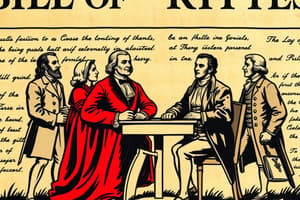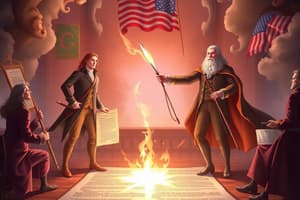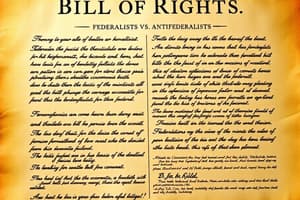Podcast
Questions and Answers
What does it mean to ratify?
What does it mean to ratify?
To approve; new states needed to approve the new Constitution.
Who were the supporters of the Constitution?
Who were the supporters of the Constitution?
- Federalists (correct)
- Democrats
- Republicans
- Anti-federalists
Who were the Anti-federalists?
Who were the Anti-federalists?
Those opposed to the Constitution who wanted more power in the hands of the states.
What does it mean to amend?
What does it mean to amend?
What is a statute?
What is a statute?
Compel means to force.
Compel means to force.
What are the Federalist Papers?
What are the Federalist Papers?
Who supported the new Constitution by promoting its lasting welfare?
Who supported the new Constitution by promoting its lasting welfare?
How was the Constitution to be ratified?
How was the Constitution to be ratified?
Who expressed concerns that the Constitution could lead to a king?
Who expressed concerns that the Constitution could lead to a king?
Who is known for writing 50 of the 85 Federalist Papers?
Who is known for writing 50 of the 85 Federalist Papers?
Why did Anti-federalists demand a Bill of Rights?
Why did Anti-federalists demand a Bill of Rights?
Who opposed the Constitution for lacking a Bill of Rights?
Who opposed the Constitution for lacking a Bill of Rights?
How did the ratification process go?
How did the ratification process go?
What was the debate in New England regarding the Constitution?
What was the debate in New England regarding the Constitution?
When did all the states finally ratify the Constitution?
When did all the states finally ratify the Constitution?
What were the first elections under the new Constitution?
What were the first elections under the new Constitution?
How was the Bill of Rights adopted?
How was the Bill of Rights adopted?
What are the main ideas written into the Bill of Rights?
What are the main ideas written into the Bill of Rights?
Flashcards are hidden until you start studying
Study Notes
Key Terms and Definitions
- Ratify: Approving the new Constitution, required by new states for adoption.
- Federalist: Supporters of the Constitution advocating for a strong central government.
- Anti-federalist: Opponents of the Constitution favoring state power and a weaker federal government.
- Amend: The process to change or add provisions to the Constitution.
- Statute: A law; includes amendments that safeguard individual and states' rights.
- Compel: To force; exemplified by the inability to force worship of a specific religion.
Influential Figures and Writings
- Federalist Papers: Authored by James Madison, Alexander Hamilton, and John Jay to defend the Constitution and outline the powers of the central government while ensuring protection of individual rights.
- George Washington's Support: Expressed that the new Constitution would "promote the lasting welfare of that country so dear to us all," in a letter to the Continental Congress.
- Patrick Henry's Opposition: Criticized the Constitution, warning it could lead to a monarchy; quoted as saying its features were "horribly frightful."
- Alexander Hamilton: Born in the West Indies, represented New York at the Constitutional Convention, wrote 50 of the 85 Federalist Papers, and became the subject of a Broadway musical.
Ratification Process
- Ratification required nine of thirteen states to hold special conventions and approve the Constitution.
- Timeline: Delaware was the first state to ratify on December 7, 1787, followed by Pennsylvania and New Jersey.
- Massachusetts Debate: Led by John Adams and John Hancock, delayed ratification until a Bill of Rights was promised; became the sixth state to ratify.
Key Events
- Final Ratification: Rhode Island, the last state, ratified the Constitution in May 1790 after delays from New York and Virginia.
- First Elections: George Washington elected President with John Adams as Vice President; New York designated as the capital.
The Bill of Rights
- Demand for a Bill of Rights: Anti-federalists argued it was necessary to protect personal freedoms and to reaffirm grievances against British rule. Concerns included potential presidential overreach.
- George Mason's Role: Virginia delegate opposing the Constitution's original lack of a Bill of Rights, authored "Objections to this Constitution of Government."
- Adoption: James Madison proposed 12 amendments; 10 were ratified by three-fourths of the state legislatures by December 1791.
- Main Ideas of Bill of Rights: Established natural rights, ensuring freedoms such as speech, religion, non-quartering of troops, and protection of individual rights.
Studying That Suits You
Use AI to generate personalized quizzes and flashcards to suit your learning preferences.




